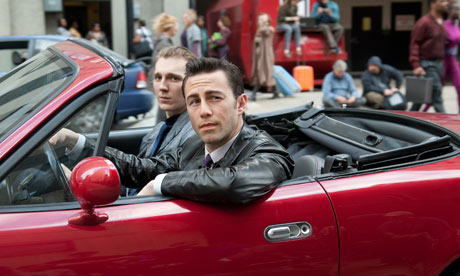
With Looper, writer/director Rian Johnson makes a quantum leap into the big league, whilst retaining the indie sensibilities of his earlier work. Rather than attempt to bowl us over with his vision of the future, the director is more concerned with the psychology of his central characters. It’s this sense of focus that separates Looper from the more cluttered, confused sci-fi we’ve become accustomed to of late. It’s a mesmerising work, sure to provoke as much debate as Inception did two years ago.
In the year 2044, time travel has not yet been invented, but by 2074, it will have been. Victims are sent back in time by the mob to be greeted with a bullet to the head by assassins known as ‘loopers’. Johnson wisely avoids clogging our heads with anything as mind boggling as the premise in his vision of the year 2044. Phones are even sleeker and guys use telekinesis to pick up girls, but these details are subtly introduced and rarely feel contrived. In addition, ‘loopers’ face the inevitability that they will one day be sent their future self to kill, thereby ‘closing the loop’, with a handsome retirement fee attached. It’s when Joe (Joseph Gordon Levitt) accidentally lets his future self (Bruce Willis) escape that things get messy.
Rather than being an arbitrary ‘future-be-crazy’ set-up to accommodate cool car chases and shoot outs, the film poses some intriguing ethical questions. While Young Joe sees his illusion of control over past and future crumbling, we are also led to identify with Older Joe. A thirty year montage linking the two is seamless – bar the bizarre sight of Willis with a full head of jet-black hair – allowing us to comprehend his agenda. A standout scene sees Older and Younger Joes face off in a diner, but rather than duke it out – well, not yet – they discuss what’s going on for a moment. The film’s big themes– the power of hindsight, the desire to control fate – are served well by a director who knows when to put the gun down.
This might make Looper sound just a little bit ponderous. Thankfully, Johnson knows his way around a set piece, but thankfully never allows action to bludgeon character development. The film’s climactic stand-off will be as memorable for its technical splendour as for the questions raised by its jaw-dropping climax. Initially distracting prosthetics aside, Gordon-Levitt ably handles the anxieties of Young Joe, capturing the angered confusion of a man literally facing his future. Willis faces a similarly difficult challenge, to depict a believable older version of the younger Joe, with the character having undergone a remarkable change in outlook over thirty years. Blending his trademark calm collectedness with a surprising vulnerability, he reminds us that he’s one hell of an actor when he needs to be.
The film’s big reveal might borrow from other, not necessarily better films of the genre, but it doesn’t stop Looper from being one of the year’s best films.
See it, love it, argue about it, and then see it again.







